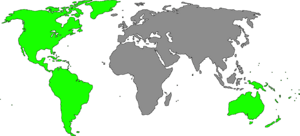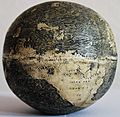New World facts for kids
The New World is a special name for the Western Hemisphere. It mainly refers to the Americas, which include both North and South America. Sometimes, it also includes islands in the Atlantic and Pacific Oceans, like Bermuda. It can even refer to Oceania, which includes Australasia.
This name became popular in the early 1500s. This was shortly after Europeans began exploring and settling in America. Before this time, people in Europe during the Middle Ages thought the world only had three continents: Europe, Asia, and Africa. These three continents are now called the Old World. The Americas were sometimes called the "fourth part of the world."
Contents
What is the New World?
The term "New World" helps us understand how people saw the world centuries ago. It describes the lands that were unknown to Europeans before the late 1400s. When explorers like Christopher Columbus sailed west, they found vast new continents. These lands were "new" to them, even though many people already lived there.
The New World includes all of North America and South America. It also covers many islands near these continents. These discoveries changed how Europeans understood geography and led to a lot of exploration.
The Old World vs. The New World
To understand the New World, it helps to know about the Old World. The Old World refers to the continents of Europe, Asia, and Africa. These were the lands known to Europeans, Asians, and Africans for thousands of years. They had long-established trade routes, empires, and cultures.
The discovery of the New World connected these two parts of the globe. This led to a huge exchange of plants, animals, ideas, and people. This event is often called the Columbian Exchange.
Naming the Americas
The large landmass of North and South America was named after an Italian explorer. His name was Amerigo Vespucci. He was one of the first to realize that these new lands were not part of Asia. Instead, they were a completely separate continent.
A German mapmaker named Martin Waldseemüller first used the name "America" on a map in 1507. He named it in honor of Amerigo Vespucci. This name soon became widely accepted for the entire continent.
The Newest World: Oceania
While the Americas were called the "New World," another large region was explored much later. This region is Oceania. It includes Australia, New Zealand, and thousands of islands in the Pacific Ocean. Because it was explored and settled by Europeans even later than the Americas, it is sometimes called "The Newest World."
Oceania's discovery and colonization happened over several centuries. This region has unique cultures, animals, and plants. Its vastness and many islands make it a truly remarkable part of our planet.
Related pages
Images for kids
-
Sebastian Münster's map of the New World, first published in 1540
-
The World Map by Portuguese Diogo Ribeiro (1529) labels the Americas as MUNDUS NOVUS. It traces most of South America and the east coast of North America.
See also
 In Spanish: Nuevo Mundo para niños
In Spanish: Nuevo Mundo para niños
 | Chris Smalls |
 | Fred Hampton |
 | Ralph Abernathy |





